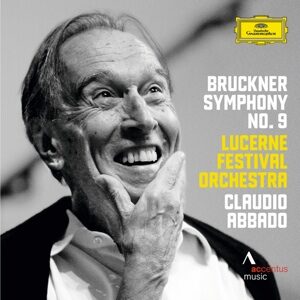Claudio Abbado usually has been a satisfying Bruckner conductor, but then his previous recordings were mostly made with the Vienna Philharmonic, a great Bruckner orchestra. Even so, his previous Ninth with that group was disappointing. This version is better, but not much. Granted, it has all of the virtues that we have come to expect: minute attention to dynamics, suppleness of phrasing, and, especially in the trio of the scherzo, remarkable transparency of texture. That said, it’s senseless to pretend that the Lucerne Festival Orchestra is a world-class ensemble with a genuine feel for Bruckner’s idiom, and Abbado was not the kind of conductor (like Stokowski, for instance) who had the ability to impose a unique sound on just about any orchestra.
You might not think that this matters so much in Bruckner, who was anything but an instrumental colorist, but it’s relevant here in one specific way: the ability to sustain tension and coherence at low dynamic levels. Abbado takes great pains over gradations in dynamics, especially piano to pianissimo. Indeed, the difference is often exaggerated to the point of mannerism in the lyrical second and third subjects in the first movement, and in long stretches of the Adagio. Whenever he does this, the music’s vitality and flow vanish (marginally slower tempos than before also don’t help). This is largely a function of the string playing, of the section’s understanding of how the music should be sustained. You will never hear this problem when, say, the Vienna Philharmonic, the Royal Concertgebouw Orchestra, or the Staatskapelle Dresden play Bruckner. Even Abbado’s relatively lousy earlier recording was better in this one respect. The climaxes also have a soft edge–despite generally fine brass playing–notably in the first movement’s coda or the big outbursts in the scherzo (not so much the Adagio); but in soft passages the music turns dull, plain and simple.
There is a strong vein of narcissism running through many of these “festival” productions. They are all about the star performer. Everyone else is along for the ride. We see exactly the same issue with Martha Argerich’s most recent concerto recordings. Of course she is wonderful, and her glamor supposedly rubs off on her second-rate colleagues and accompanists—except that it doesn’t, often as not, and the situation is only amplified with conductors, who express themselves exclusively in terms of the sounds that the players make. Meanwhile the critics, particularly at local newspapers and those carefully selected to be guests of the festival, obediently rave about the results. The truth, however, is that most of the great, established orchestras are better at what they do than are most of their conductors, especially those ensembles with proprietary experience in certain repertoire.
Today’s conductors enjoy the unique opportunity of basking in an acclaim that derives from decades of tradition and expertise that they played no part whatsoever in fostering. How much credit for Abbado’s prior success in Bruckner goes to the Vienna Philharmonic? On evidence here, quite a bit.
































